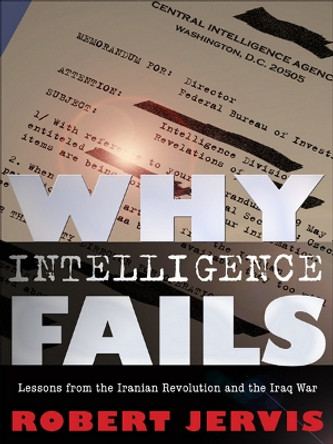Description
The U.S. government spends enormous resources each year on the gathering and analysis of intelligence, yet the history of American foreign policy is littered with missteps and misunderstandings that have resulted from intelligence failures. In Why Intelligence Fails, Robert Jervis examines the politics and psychology of two of the more spectacular intelligence failures in recent memory: the mistaken belief that the regime of the Shah in Iran was secure and stable in 1978, and the claim that Iraq had active WMD programs in 2002.
The Iran case is based on a recently declassified report Jervis was commissioned to undertake by CIA thirty years ago and includes memoranda written by CIA officials in response to Jervis's findings. The Iraq case, also grounded in a review of the intelligence community's performance, is based on close readings of both classified and declassified documents, though Jervis's conclusions are entirely supported by evidence that has been declassified.
In both cases, Jervis finds not only that intelligence was badly flawed but also that later explanations-analysts were bowing to political pressure and telling the White House what it wanted to hear or were willfully blind-were also incorrect. Proponents of these explanations claimed that initial errors were compounded by groupthink, lack of coordination within the government, and failure to share information. Policy prescriptions, including the recent establishment of a Director of National Intelligence, were supposed to remedy the situation.
In Jervis's estimation, neither the explanations nor the prescriptions are adequate. The inferences that intelligence drew were actually quite plausible given the information available. Errors arose, he concludes, from insufficient attention to the ways in which information should be gathered and interpreted, a lack of self-awareness about the factors that led to the judgments, and an organizational culture that failed to probe for weaknesses and explore alternatives. Evaluating the inherent tensions between the methods and aims of intelligence personnel and policymakers from a unique insider's perspective, Jervis forcefully criticizes recent proposals for improving the performance of the intelligence community and discusses ways in which future analysis can be improved.
About the Author
Robert Jervis is Adlai E. Stevenson Professor of International Politics at Columbia University. He is the author of many books, including The Meaning of the Nuclear Revolution, also from Cornell, and, most recently, American Foreign Policy in a New Era.
Reviews
In Why Intelligence Fails, Jervis examines two important U.S. intelligence lapses-the fall of the Shah in Iran and WMDs in Iraq-and tries to account for what went awry. After both, the CIA hired Jervis-a longtime student of international affairs-to help the agency sort out its mistakes. He thus brings an invaluable perspective as a smart outsider with sufficient inside access to appraise the agency's blind spots.
-- Gabriel Schoenfeld * Wall Street Journal *In this cogently argued and revealing book, Jervis, a veteran CIA consultant, uses the Iranian and Iraqi cases to dissect why, in some circumstances, intelligence fails to provide accurate analysis to policymakers.... The section on Iran... identifies a number of errors with respect to intelligence on Iran, ranging from the mistaken belief that the shah was strong enough to undertake decisive and sustained action against his opponents to underestimating the role played by religion and nationalism in Iranian society. In the section on Iraq... Jervis contends that the fundamental reason for the WMD intelligence failure was that it made the most sense to assume that the country possessed WMD, given the Iraqi government's previous behavior. Highly recommended for all interested academic and general readers.
* Library Journal *Jervis's practical experience is as a consultant with the CIA, and he offers a refreshing analysis and defense of this engagement with a government agency. Why Intelligence Fails feels like a reflection on a lifetime of thinking about intelligence.... The case studies (one of which is a slightly redacted version of the lessons-learned report Jervis wrote for the CIA about the Iranian Revolution, complete with comments made on it by senior CIA figures) ably highlight the lessons Jervis wishes us to take away from his study. Most importantly, he argues that further reforms of the intelligence machinery-a favorite reflex of politicians-will not necessarily produce improvements to intelligence product.
-- Robert Dover * International Affairs *Awards
Winner of Shortlisted for the 2011 Arthur Ross Book Award gi.
Book Information
ISBN 9780801447853
Author Robert Jervis
Format Hardback
Page Count 248
Imprint Cornell University Press
Publisher Cornell University Press
Weight(grams) 907g
Dimensions(mm) 235mm * 155mm * 24mm







